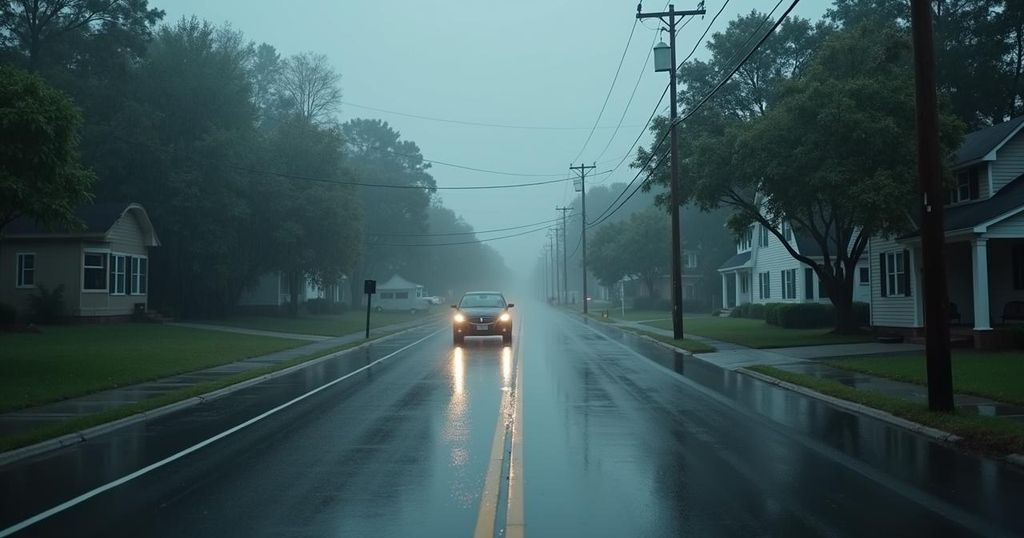Impact of Hurricane Helene on Southwest Virginia: Death Toll Rises Amid Continued Threat of Rain

Hurricane Helene has resulted in significant destruction in Virginia, with at least two fatalities reported. Governor Glenn Youngkin has announced FEMA disaster declarations and highlighted the unprecedented storm damage in the region. Ongoing rainfall poses further risks as recovery efforts continue, revealing the increasing strain on local infrastructure due to climate change.
The aftermath of Hurricane Helene has resulted in at least two fatalities in Southwest Virginia, with ongoing concerns about additional rainfall from a new storm system developing along the Gulf Coast. This incident has led to significant devastation across multiple states in the Southeast, claiming over 100 lives, as reported by the Associated Press. Within his latest briefing, Governor Glenn Youngkin emphasized the unprecedented severity of the storm impacts, noting the historical nature of the flooding experienced by long-time residents. The federal government has responded by approving an Emergency Disaster Declaration, facilitating the release of Federal Emergency Management Agency (FEMA) resources for several affected locales, including the counties of Grayson, Smyth, Tazewell, Washington, Wise, and Wythe, in addition to Galax City. Plans are in place to extend this declaration to thirteen more counties and five additional cities as the situation progresses. Rainfall in areas such as Galax has reached alarming levels, with reports of 8.6 inches within a mere 72-hour period, while the small town of Damascus experienced 19.5 feet of flooding. Rescue operations have been crucial, with over 70 swift water rescues conducted, including notable efforts by the Virginia National Guard. Governor Youngkin acknowledged the cooperation of various agencies, including efforts to restore vital phone services with mobile towers for residents impacted by the storm. To date, approximately 282,000 customers lost power at the storm’s height, with this figure decreasing to about 83,000 as recovery efforts continued. The Virginia Department of Forestry has been active in clearing roadways, although several remain closed due to damage, impeding travel across the mountainous terrain. Further, the recovery efforts will face challenges relating to contaminated water and debris removal in areas with compromised safety, particularly behind dams. Governor Youngkin has indicated the state’s intention to request a Major Disaster Declaration, which would further facilitate the release of federal funds for individual assistance and local governmental aid. The request is anticipated to be substantial, as extensive assessments of property and infrastructure damages are underway. However, complications may emerge due to the exclusion of FEMA funding from a recent congressional budget agreement, requiring Congressional approval for any supplemental disaster funds. The National Weather Service has indicated ongoing rain through the week, raising alarms about exacerbated conditions in the New River Valley, where infrastructure has already been stressed by heightened rainfall trends over recent years. Experts highlight the increasing risks associated with climate patterns, indicating communities have already recorded a 20% increase in rainfall since 2006, thereby worsening the potential consequences of subsequent storms.
Hurricane Helene, a Category 4 storm, significantly impacted several states in the Southeast United States, leading to a tragic death toll and extensive flooding. In Virginia, the storm’s effects were felt acutely, with two confirmed fatalities and widespread disaster. In response, state and federal authorities are mobilizing resources to assist affected regions, particularly in Southwest Virginia where rainfall amounts reached dangerously high levels. The incident underscores a growing concern regarding the impacts of climate change, as communities are starting to face increasing precipitation and subsequent flooding more frequently than in the past, piecing together the urgent need for disaster response mechanisms and infrastructure resilience.
In summary, Hurricane Helene has inflicted severe damage throughout Southwest Virginia and adjacent states, leading to fatalities and extensive flooding. The state’s response includes a request for further federal support as recovery efforts ramp up amidst ongoing weather concerns. As communities grapple with the aftermath, the situation reveals the pressing challenges posed by climate change and underscores the importance of preparedness in facing future storms.
Original Source: virginiamercury.com








